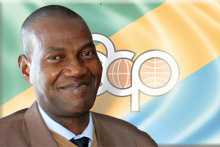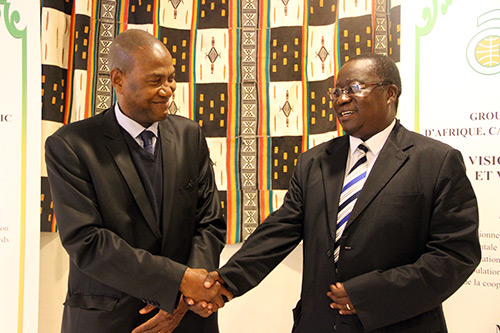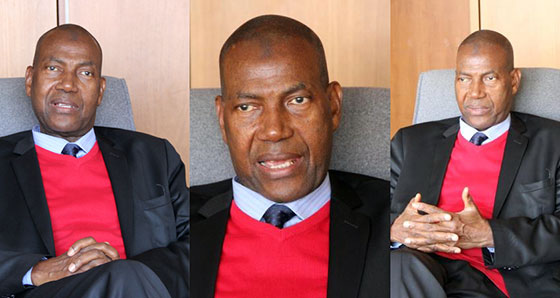INTERVIEW SPECIAL: CHAIR OF THE ACP COMMITTEE OF AMBASSADORS, H.E DR. OUSMANE SYLLA (GUINEA)
 Former Mines Minister of Guinea and current Ambassador to the European Union H.E Dr. Ousmane Sylla will preside over the Committee of Ambassadors of the African, Caribbean and Pacific (ACP) Group for the period 1 August 2014 – 31 January 2015. ACP Press discusses his plans for the ACP work programme, the post-2015 development agenda, and the economic transformation of ACP countries.
Former Mines Minister of Guinea and current Ambassador to the European Union H.E Dr. Ousmane Sylla will preside over the Committee of Ambassadors of the African, Caribbean and Pacific (ACP) Group for the period 1 August 2014 – 31 January 2015. ACP Press discusses his plans for the ACP work programme, the post-2015 development agenda, and the economic transformation of ACP countries.
Press ACP: As the new Chair of the Committee of Ambassadors, you will be steering the organisation’s most active principal organ. What are your plans or focus areas for the six months at the presidency?
Dr. Ousmane Sylla: The first main challenge we face is making a bigger impression as an organisation. At the moment, ACP is not very well-known, and one of the first priorities for me is to be more offensive in terms of communication. We have 80 countries in our Group (South Sudan being an observer member) so it’s a very big group, but we must communicate more with our people, internationally. I think leading up to 2020 we must be much more offensive in this area.
Secondly, we need a restructured Secretariat. The Secretariat at the moment is doing a good job, working very hard with very little financial resources. My call as Chair of the Committee is that all member countries pay their contributions to the Group for 2014. We need these resources – in order to achieve anything we need to be financially independent. I would like to expressly thank Equatorial Guinea and Angola, for voluntarily committing additional funds to the ACP Group for its operations… The role of the Secretary General should also be reinforced as the manager of the Secretariat but also as the political speaker for the Group, similar to his counterparts in other international organisations.
Thirdly, there will be a stronger focus on intra-ACP cooperation, South-South and North-South cooperation, and also triangular cooperation. At intra-ACP level, we need to make a diagnostic about the possibilities or opportunities found in one country and see how they work in another. For instance, take countries like Cabo Verde, Mauritius and Botswana, which are doing well financially. Before looking towards Europe or India or China for inspiration, why not ask our own ACP members: what are you doing to be so successful? How are you executing your reforms? What can we learn from you in terms of small enterprise development, gender mainstreaming, job creation, or protection of the environment? Why not explore how Guyana, for instance, can send technical assistance to African countries? Intra-ACP cooperation and exchange of experience amongst ACP countries is crucial.
Fourthly, we will look at our relationship with the European Union. We need our traditional partners even after 2020 – that’s certain. But 40 years together is a long time and I feel the EU wants to see the ACP Group a little more independent! We need to diversify sources of financial support and not rely only on the European Development Fund (EDF). This is one of the key focuses for the ACP Eminent Persons Group (which has been consulting all member regions about the orientation of the organisation after the ACP-EC Partnership Agreement concludes in 2020) and the ambassadorial Working Group on Future Perspectives of the ACP.We must try to enhance our relations with the emerging countries known as BRICS. We must be more aggressive, more offensive to introduce our group to USA, Japan, Canada, and the Arabic countries. The idea is to intensify the relations we have now, but also diversify.
PACP: Speaking of the future, you are chair of the ACP Ambassadorial Working Group on the Post-2015 Development Agenda. What are the key concerns of the ACP Group as far as the post-2015 agenda is concerned?

OS: The Working Group worked very hard on elaborating an ACP Declaration on the post-2015 development framework. We integrated issues on development, transforming our economies, industrialization of our countries, as well as social aspects such as education and training, health, and protection of the environment. We also underlined the need for inclusive developments – that is, not only developing the capitals, but the rural areas as well.
We were successful in coming up with an ACP-EU joint declaration on the post-2015 development agenda which was been adopted in June. It was not easy! We had many many meetings. The EU side was insisting on highlighting good governance, democracy and human rights, and not too much on industrialization, development, and transforming economies. We, as the ACP, insisted on the development aspect. There was even an issue with the title, where we had to push for the inclusion of the word “development”, as in “Post-2015 Development Agenda”.
At the end of the day we reached a good compromise – each side had to make concessions. It was the first time for two large groups (the ACP and EU) to work together in parallel on a joint post-2015 declaration. Normally you have an African Union position, or a declaration coming from the Caribbean or Pacific. But this is the first common paper from a bloc of 80 countries from the South plus 28 European countries, so it was quite historical. Now the hope is to have a common position for both organizations at the United Nations General Assembly in September 2015.
PACP: You spoke about the “economic transformation” of ACP countries – especially since the vast majority of the member states are still developing, with 40 amongst the Least Developed in the world. Can you elaborate further, especially on the role of the ACP Group in this process?
OS: For 50 years, ACP countries have been exporters of raw material and commodities to the industries of Europe. This must stop. We have to make transformations in our own countries to create industries. For example, Guinea, since independence in 1958, has been exporting bauxite – the raw material used to make aluminum and metal. We are now in negotiations with companies in the world to tell them that we cannot continue to export bauxite. Instead, we need technology, energy, and infrastructure to transform bauxite in our own country and to bring some added value. This is the same for many other ACP countries.
However the focus is not only on industrialisation bit also on the need for equity, justice and inclusivity. We must train our people. If you look at the role women are playing, they need to be encouraged and get educated, build their capacity so that they can manage small enterprises and medium enterprises. We need to promote youth. Why are youth dying in Lampedussa? They are risking their lives because they are jobless! We must create jobs in our countries, then they will stay and develop our countries instead of emigrating. Take the example of Angola and Portugal. Angola was a port colony for many years. We used to see young Angolans go to Lisbon to get jobs. But now there are more and more Portuguese migrating to Angola because Angola has oil, diamonds, and it’s developing its economy. This is what we need – European immigrants to our countries.

PACP: Post-2015 framework is a follow up to the Millennium Development Goals (MDG’s). Obviously they were not all achieved in the targeted time frame. Why?
OS: The MDG’s fell short in ACP countries because of bad governance. We have to be very frank with ourselves. The truth is that in the past 20 years, many countries have not had a very good record in terms of governance. Corruption is one of our weaknesses, dictatorships, lack of democracy, inequality, the destruction of the environment etc. What Africa needs is good leaders and elite who respect our constitutions. They need to know that there is no chance to develop if Africa stays the same. But there are more and more cases of leaders accepting defeat and letting others take the helm, rather than trying to hold power forever. I do see positive change coming. Secondly, we didn’t have the political will to help us transform our economies. They want to keep us as raw material suppliers. But if we can change these things, we can achieve many many post MDGs.
At the same time, we must be positive. There has been a tendency amongst some of our partners to concentrate only on “fighting extreme poverty”. Personally I don’t like this phrasing. Instead of speaking about poverty, disease, and wars, why can’t we be more positive to say “creating wealth”. This is more optimistic, and I am very optimistic for the future of the ACP Group.
(Photos: H.E Dr. Ousmane Sylla; Ambassador Sylla with the outgoing Chair, Tanzania Ambassador H.E Dr Diodorus Kamala)
– ACP Press
